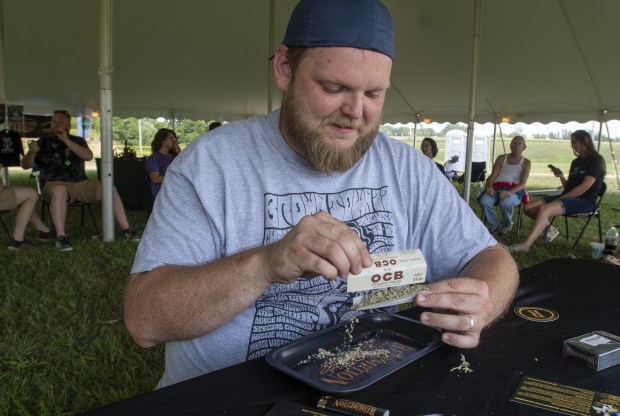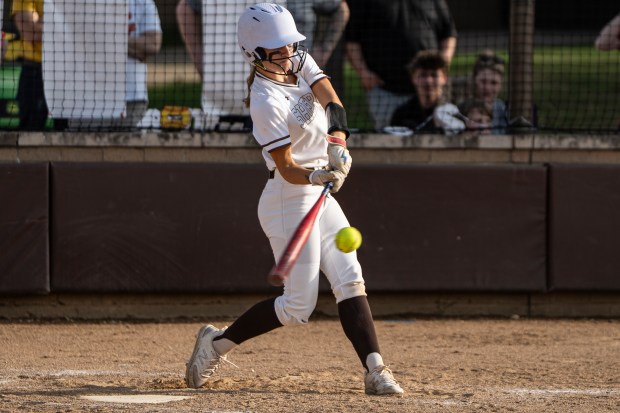Democratic candidate for governor Jennifer McCormick released a cannabis legalization plan on Thursday, which area legislators who have championed the issue praised.
The plan aims to legalize adult use of cannabis in Indiana “in a responsible and well regulated industry,” by first creating a medical marijuana industry with a transition into full adult-use cannabis, according to a new release.
“Hoosiers have made it clear — they support adult-use cannabis and are frustrated by Indiana’s outdated prohibition laws,” McCormick said in the release. “By taking a responsible, phased approach, we can ensure that our state is prepared for full adult-use legalization while immediately providing relief through medical marijuana.”
Marcus Safirt, of Michigan City, Indiana, rolls a joint during The Original Cannabis Crown at the Hartford Motor Speedway in Hartford, Michigan on Friday August 27, 2022. Indiana, which maintains a ban on cannabis products, is surrounded by states who have legalized marijuana in some form, but Democratic gubernatorial candidate Jennifer McCormick on Thursday released her plan to phase-in legalization. (Andy Lavalley/for the Chicago Tribune)
In the plan, McCormick proposes establishing an Indiana Cannabis Commission, which would be responsible for overseeing the legal cannabis industry, including regulation, licensing and ensuring compliance with safety standards, according to the release.
Then, the plan would immediately establish a medical marijuana industry to give Hoosiers access for medical purposes and allow the state to address potential challenges, according to the release.
From medical marijuana, the plan calls for a transition to adult-use cannabis. A phased approach would mitigate challenges and ensure the state’s cannabis market remained well-regulated and effective, according to the release.
The plan would also focus on regulating hemp-derived THC products that can be found in gas stations and smoke shops throughout the state, which would protect consumers and ensure that cannabis products meet safety standards, according to the release.
Legalizing marijuana would generate an estimated $172 million annually in tax revenues for the state, which would provide a boost to the state’s economy and funding for essential services, according to the release.
The four states surrounding Indiana — Michigan, Illinois, Kentucky and Ohio — have in recent years legalized marijuana in some form. Hoosiers have been traveling out of state to buy marijuana, which means Indiana loses out on sales tax revenue, said former State Senator Karen Tallian, who proposed many pieces of cannabis legislation.
Illinois collected $417.6 million in sales tax in 2023, which brought the state’s total marijuana sales tax collected to more than $1.6 billion since it was made legal beginning in 2020, according to the Illinois Department of Revenue.
“Indiana is an island of prohibition surrounded by states with legal cannabis industries,” said McCormick.
Republican candidate for governor Mike Braun did not return requests for comment.
When she was in the legislature, Tallian said former governor Mike Pence told her “in no uncertain terms” that he wouldn’t sign a bill to legalize marijuana. Governor Eric Holcomb did not seem interested in legalization either, she said.
Tallian said marijuana legalization is no longer a partisan issue because Republicans have started to admit that it’s inevitable.
“I’m just really happy that we have someone who is willing to say marijuana out loud and talk about it instead of stonewalling with the fact that Indiana can’t do anything until the federal government decriminalizes it,” Tallian said.
Delton Huffman, of Michigan City, Indiana, takes part in the two-day Original Cannabis Crown event at the Hartford Motor Speedway in Hartford, Michigan on Friday August 27, 2022. (Andy Lavalley/for the Chicago Tribune)
State Sen. Rodney Pol, D-Chesterton, who has proposed marijuana legislation, said he was pleased to hear that McCormick proposed a plan to legalize cannabis because no other gubernatorial candidates or governors have addressed the issue head on.
“We’re on an island here and we have to address that,” Pol said.
State Rep. Michael Aylesworth, R-Hebron, said he’s long supported legalizing medical marijuana to help veterans with potential illness or disorders, like post-traumatic stress disorder.
But, Aylesworth said he doesn’t support legalizing marijuana for recreational use or the idea of a cannabis commission to study legalization.
“She’s using it as a campaign tool for her candidacy,” Aylesworth said of McCormick’s plan.
Tallian said officials with McCormick’s campaign reached out to her to talk about a cannabis plan. They talked the most about the cannabis commission component, Tallian said.
“A governor can’t legalize it. That’s a job that only the legislature can do. But, the governor can create a commission to see what other states are doing and tee it up and give them an indication she would sign a bill,” Tallian said.
Tallian, who proposed three bills to create a cannabis commission during her time as a legislator, said when legislators get involved to create the commission it becomes “a big mess” with everyone voicing their opinions. But a governor proposing the commission would likely be a smoother process, she said.
A cannabis commission should include people with different professional backgrounds, Tallian said, like people with economic and business, science and research backgrounds.
The commission shouldn’t have a lot of people because it could convolute the discussion, but it shouldn’t have too few people either because then the views could become too narrow, Tallian said.
“It has to be a relatively compact number,” Tallian said.
Tallian said she doesn’t completely agree with the portion of the plan that calls for a phasing in from medical marijuana to adult-use marijuana because enough states have legalized marijuana that best practices could be pulled from.
But, Tallian said the phase-in approach could be a way to ease the state into the world of legalized marijuana.
Pol said it is a “brilliant” idea to start with medical marijuana and then adult-use legalization because Indiana tends to move slower than other states on issues like this one.
“She knows the state legislature and she knows the people,” Pol said.
Tallian said she supports regulating hemp-derived THC to protect Hoosier consumers. Pol said the measure is “a long time coming.”
If the plan were implemented, Tallian said elected officials should then look into decriminalizing the possession of marijuana.
In May, the Biden Administration moved to reclassify cannabis to a less restrictive category — from a Schedule I to a Schedule III drug — under the Controlled Substances Act. If implemented, the McCormick plan would create “insurmountable” pressure on the legislature to pass a bill to legalize marijuana, Pol said.
Indiana is losing money as Hoosiers travel out of state to legally buy marijuana and losing money putting people in jail for marijuana possession, which impacts the economy as those charged face being fired from work, Pol said.
But, if the state legalized marijuana, it would further expand the state’s economy as people would live here to work in the marijuana business, Pol said. The sales tax could also fund different state services, he said.
“When we’re told there’s no money for free lunches or mental health, well here you go. Now we do,” Pol said.
The economic benefits of marijuana are “thin arguments,” Aylesworth said.
“Luckily, Indiana is in a strong financial position. We’re not in debt. We pay our bills on time,” Aylesworth said. “We try to run the state budget like a home budget — we have a savings account for a rainy day.”





